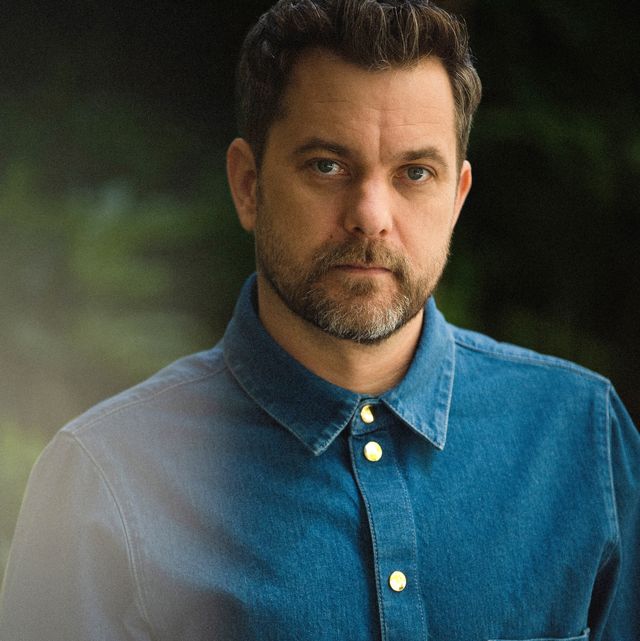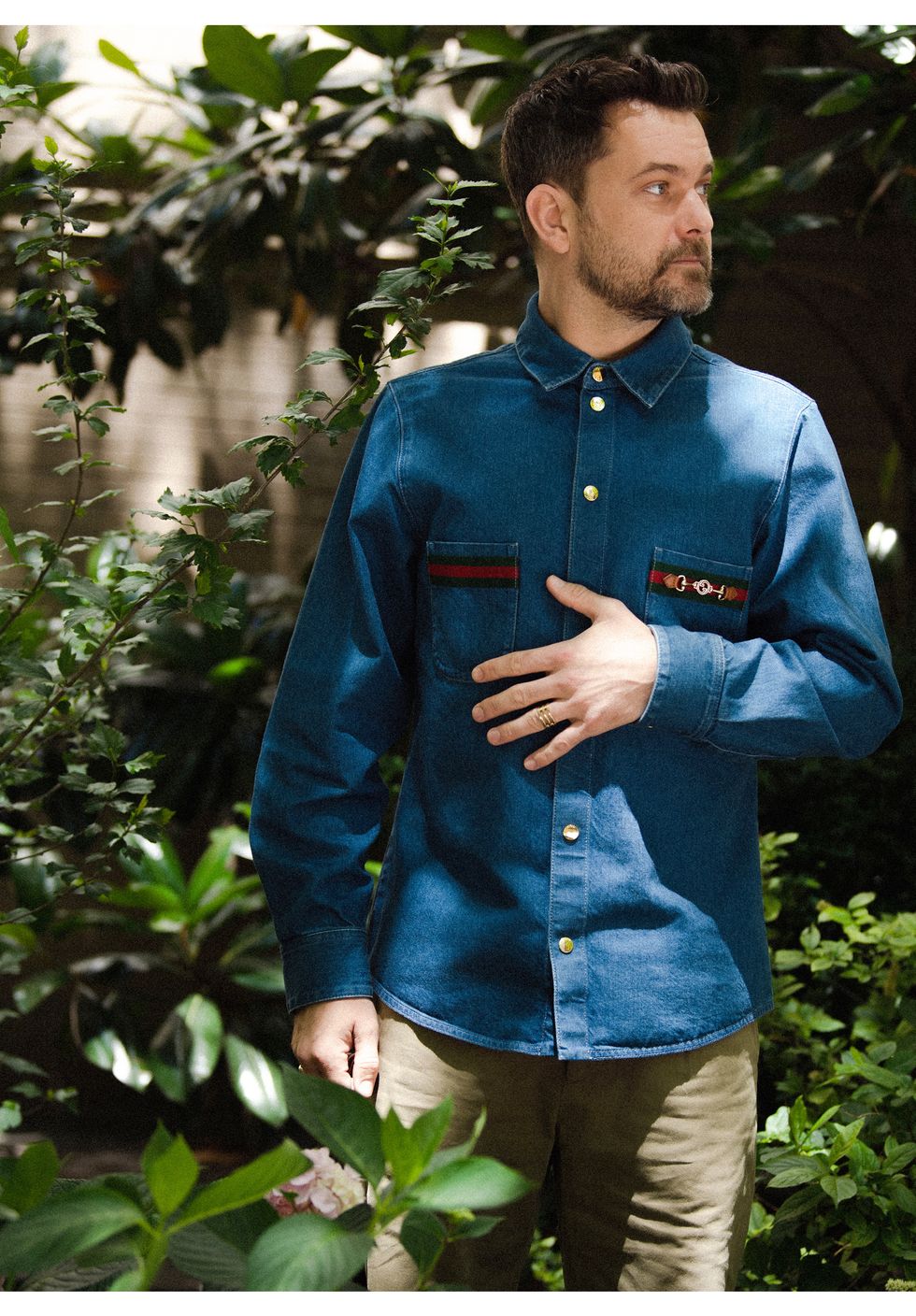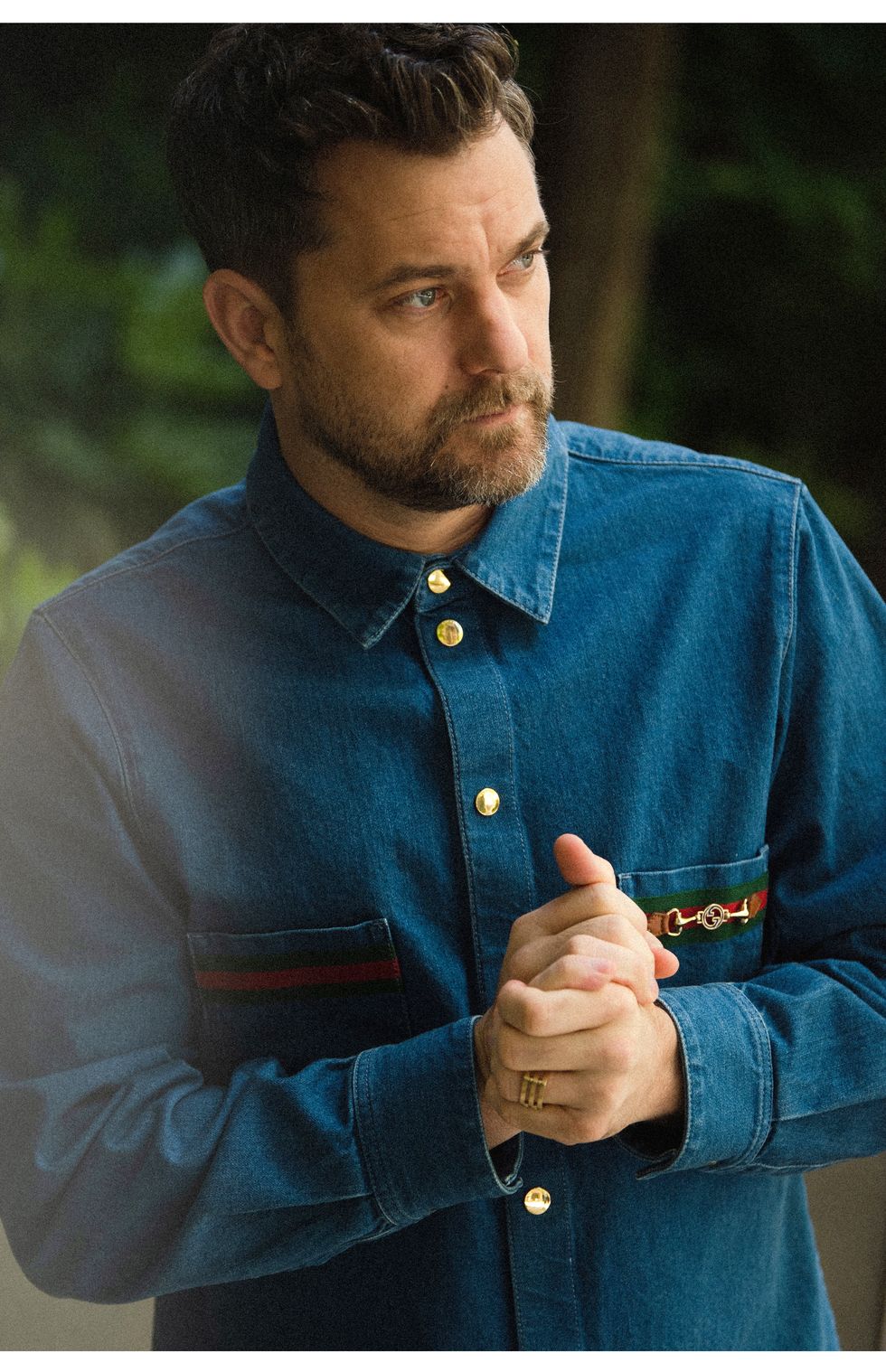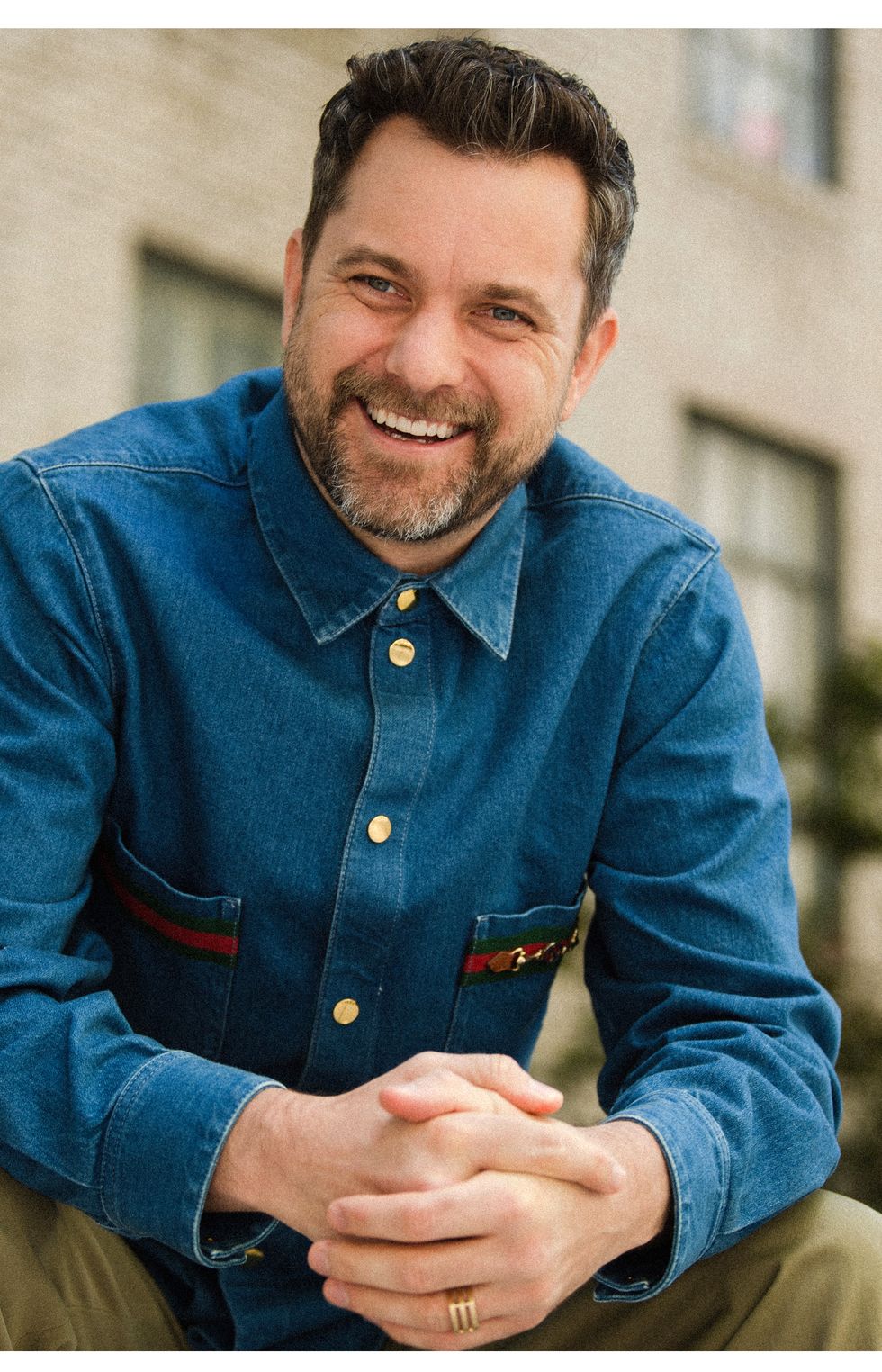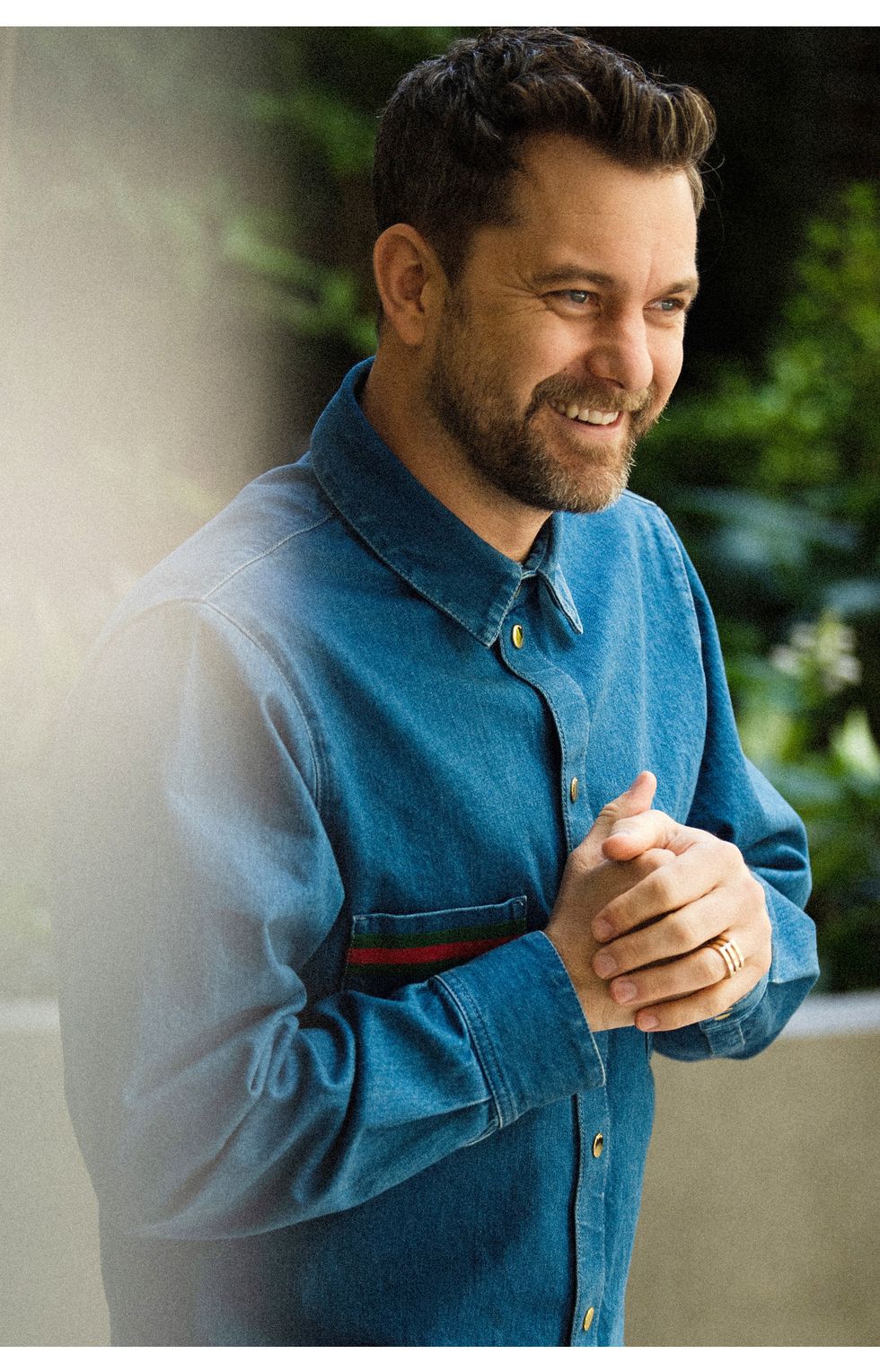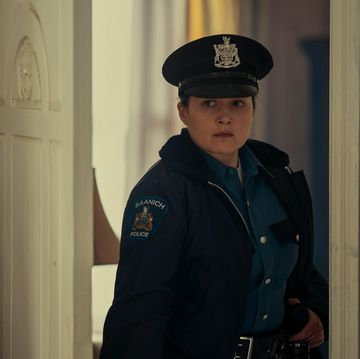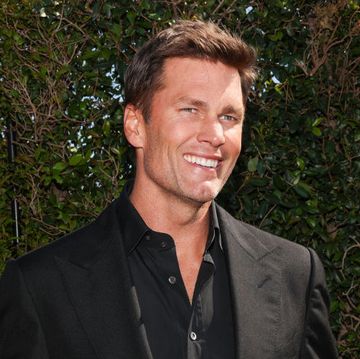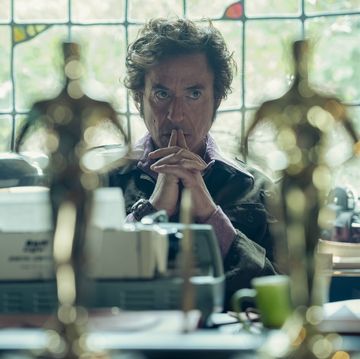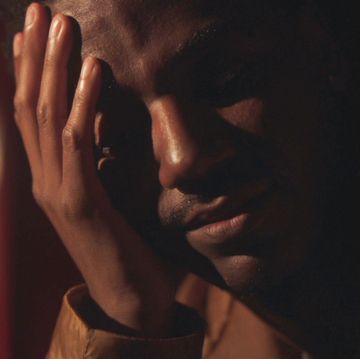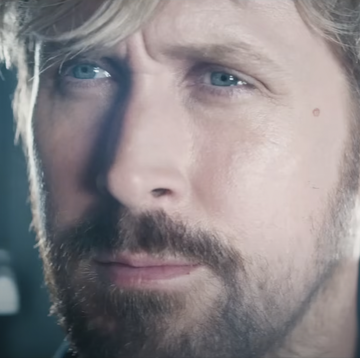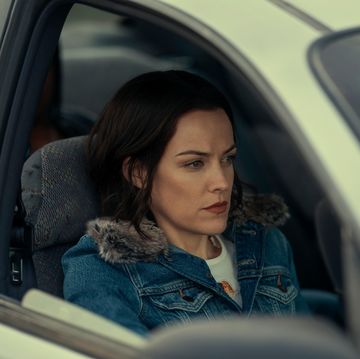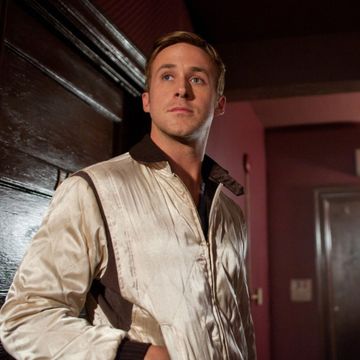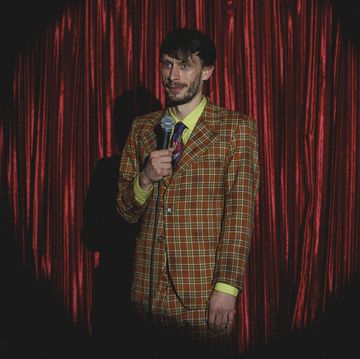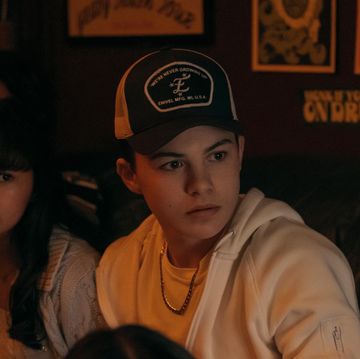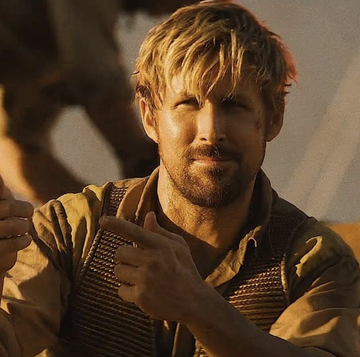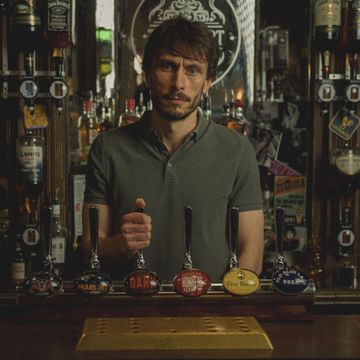There is a theory about famous people: that they stay the emotional age they were when they first became A Thing, forever. This does not apply to Joshua Jackson. At 43, Jackson has been known for nearly three-fourths of his life. He began the 1990s starring in Disney’s Mighty Ducks franchise as Charlie Conway and finished it on Dawson’s Creek. But evolution has remained core to his personal aims. He says that the peak of his celebrity—the early 2000s, as the iconic group of Wilmington, NC high schoolers shot into the stratosphere—was, for the most part, “really uncomfortable.”
He’s uncomfortable today, too, when he shuffles unevenly from our photoshoot to our video studio and, finally, to a theoretically comfortable chair within the Esquire offices in midtown Manhattan, but this time it’s his back that’s hurting. The irony of this is not lost on him. We’re here to discuss his new TV series, Dr. Death, about the real life Dr. Christopher Duntsch, a spinal surgeon now imprisoned for killing two patients, and maiming many more, while operating on their spines in the early 2010s. (The story was most recently made famous by a highly addictive, 2018 podcast of the same name.) Jackson, who plays the main character and tweaked something just a few days ago, can barely stand up straight. “The other day, I was definitely laying on the floor in the green room,” he says, referencing the show’s Tribeca Film Festival premiere. “I think 50% of the people just thought I was being pretentious, but the other 50% were like, are you okay?”
Are we ok? It’s a question hanging in the air as pandemic restrictions loosen and the noise of life comes back. As for film sets opening and getting back to work—which for this production happened in New York City last September—Jackson credits the entertainment industry unions for figuring out new methods to keep everyone safe. “It’s just not us [actors] who came back,” he says of the set’s stars (Christian Slater, Alec Baldwin, Kelsey Grammer, and Grace Gummer each have roles opposite Jackson), ”and the additional burden was put on the crews to find the working protocols. It’s a testament to [them] that we were able to.”
It was a thought-provoking time for Jackson to return to the city, and especially to play a medical professional. Jackson’s brother is an ER doctor in Manhattan, who spent all of last year fighting on the front lines of the pandemic. “I was talking to my brother as things were really kicking off, more so than the news when I could get ahold of him, and he was in the midst of having to make, daily, the most awful decisions you can possibly imagine. That’s the heroic side of the medical community.”
Dr. Death is not about that side. Jackson’s character, Christopher Duntsch, is a spinal surgeon with dubious motives, who chooses his speciality for more or less financial reasons, to tragic consequences. It’s something Jackson has, as is evident, thought about a lot. “The institutions are not actually built for patient outcome,” he says.
He continues: “Christopher Duntsch is an extreme outlier, but way too often in the American medical system, the patient’s needs are actually pretty far down on the list of priorities. That’s a big part of what our show is about. It’s not just, how this man was broken, but the reality that there did have to be a system around him, and institutions around him, that continued to support him. You see that all of these peripheral pieces led to life-altering results for 33 people. For two people, life-ending.”
This is all potentially risky subject matter after a year in which the public need for doctors has perhaps never felt stronger. But although it’s a show with a diabolical doctor at its center, a more almighty villain emerges: a healthcare system that prioritizes the bottom line over patient care. “We so want to believe in doctors,” he says. “And you’re in a vulnerable position, no matter what’s going on with you. But doctors are human.” He adds: “I’m not going to say that the hospital administrations that supported Christopher Dunstch are necessarily evil but I will say that the systemic breakdown and the bureaucratic breakdown that allowed [him] to happen is evil. And because the social safety net in this country is so threadbare—the most unbelievably punitive version of a safety net—you’re just left to your own.”
America's healthcare system made its way into Jackson’s own home in an entirely new way last spring when he and his wife, actress Jodie Turner-Smith, prepared for the birth of their first child, a daughter. In the early months of the pandemic response in America, many hospitals weighed making women give birth alone, sans partners, to reduce the risk of COVID-19 transmission. Turner-Smith is Black, and as Jackson says, that added an extra layer of unease to approaching labor alone. “The American medical system has a horrendous track record with Black women,” he says. They decided on a home birth for her April delivery.
“She wanted to be in a place where she was as comfortable as possible, understandably,” recalls Jackson. “And I wanted her to be in a place where she felt like she was being heard at every step along the way, rather than having to go through that filter of being a Black woman interfacing with the American medical system.”
Just a few months later, the Department of Health would put out explicit instructions to hospitals that women should not, unless they so choose, be left alone during childbirth. “[Labor] is lonely at times,” says Jackson, “and scary at times, and also transcendental and beautiful, and you want to have your partner there. I’m grateful for every second I got to be a part of bringing our daughter into this world. It’s a magical experience—we don’t talk enough about the positives.”
Of course, COVID-19 wasn’t the only thing coursing through this nation in the last 15 months. And being able to chart his daughter’s life against the seminal events that followed her arrival—mass protests and a historic election—is something that’s occurred to the actor.
As protests turned widespread following the murder of George Floyd, Jackson says it brought on necessary conversations inside his own mixed-race home. After the birth of their daughter, Jackson says his mother-in-law and nanny, both of whom are Black, moved in with the couple. “It’s a constant conversation between myself and my wife, but to sit with the pain of these Black women, as they’re trying again to understand why this country that they choose to live in, and choose to love, hates them so much,” he recalls, “there was an intimacy, inside of that space, that I had never experienced.”
He continues: “My sincere hope is that the feeling doesn’t go away. Over the course of that summer, the discomfort of white people of feeling complicit [in structural inequities] became more uncomfortable than the admission that we have a massive problem. To me, that is hopefully a sign of real progress.”
Three decades into his career, with leeway to be picky, Jackson is trying to use that stature to affect change. That means taking roles in projects that either explore a perspective other than the historically-favored white male gaze or those that meditate on societal strictures. Aside from Dr. Death, this has recently meant secondary roles he’s played, like on the Reese Witherspoon and Kerry Washington-led Little Fires Everywhere as well as in Ava Duvernay’s When They See Us.
The stories we tell are important, and they have real, tangible consequences. In just one episode, Watchmen was able to raise the awareness of the Tulsa Massacre to the tune of millions of individuals. Tom Hanks, by way of the New York Times, references this influence in a new public call for historically-based projects for the screen to reflect the realities of racism. Jackson might argue to go one step further: “Why not Marvel?,” he asks by way of explanation. “What are those but modern myths? Why can't we have modern myths that are more honest about how we got here? We don’t come from a perfect past, but the more we pretend like it is, the more we ensure that we won’t have a perfect future.”
He believes the pandemic restrictions were a boon to the protests following the murder of George Floyd. “There was a mental space that white people didn’t really have before to focus and concentrate on the specific inequities of policing,” he says. “We had seen individual protests, but they would just kick up and then get lost in the noise of day-to-day life. [Last year] allowed white people to take that moment to say, I really cannot abide by this anymore. And it can’t be reactive, it has to be proactive. It has to be, I don’t want this done in my name anymore.”
That is how some—many—white people responded last year. But there remains a healthy portion of the population who vehemently oppose the reality that systemic racism even exists. This is something Jackson thinks about: “We’re only truly defensive about the things we feel insecure about,” he reasons. “It’s uncomfortable to say that while I have worked hard and while I believe that I am deserving of the things that have come in my life, had it not been for these structural inequities, I would have had a very different outcome.”
Or, as he adds, more simply: “We don’t like not being the heroes of our own stories, right?”
